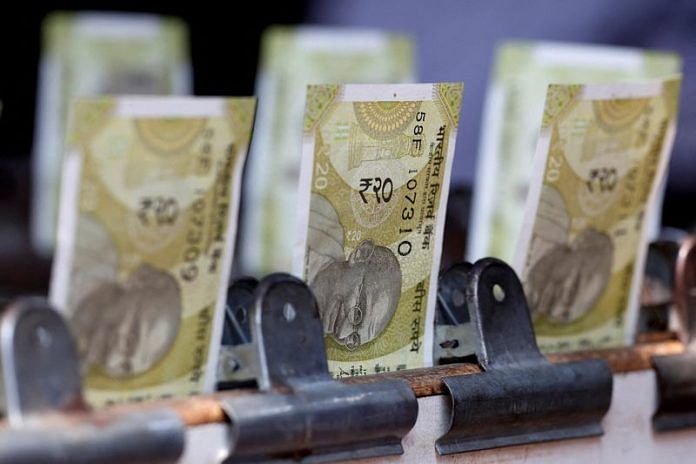By Jaspreet Kalra
MUMBAI (Reuters) – The Indian rupee ended nearly unchanged on Friday to cap its worst weekly performance in a little over four months, as equity outflows surged and crude oil prices rose due to a worsening of the Middle East conflict.
Intervention by India’s central bank limited losses, traders said.
The rupee closed at 83.9725 against the U.S. dollar, almost flat compared to its close at 83.9675 in the previous session. The currency fell 0.3% week-on-week.
Large foreign banks dominated dollar bids during the session, likely related to outflows from equities, a foreign exchange trader at a state-run bank said.
The Reserve Bank of India intervened in both the non-deliverable forwards and local spot FX market to help the rupee stay above the psychologically important 84 mark, traders said.
The rupee had declined to its record low of 83.9850 last month.
India’s benchmark equity indexes, the BSE Sensex and Nifty 50, were down over 4% each on the week, their worst weekly performance since June 2022.
Foreign investors have net sold about $3.5 billion of local stocks over the previous three trading sessions.
The rise in oil prices, regulatory tightening of equity derivatives trading and China’s recent stimulus measures were cited by analysts as reasons for outflows from Indian stocks.
Brent crude oil futures were at $78.1 per barrel, up nearly 8.5% on the week as escalating tensions in the Middle East prompted concerns about supply.
Investors awaited the release of U.S. non-farm payrolls data later in the day for cues on whether the Federal Reserve will cut rates by 50 or 25 basis points in November.
“In the case of a downside surprise for payrolls, the dollar would probably lose out on 50bp by the Fed in November, but the downside would be contained by higher oil prices and risk aversion,” Societe Generale said in a note.
(Reporting by Jaspreet Kalra; Editing by Mrigank Dhaniwala)
Disclaimer: This report is auto generated from the Reuters news service. ThePrint holds no responsibilty for its content.



